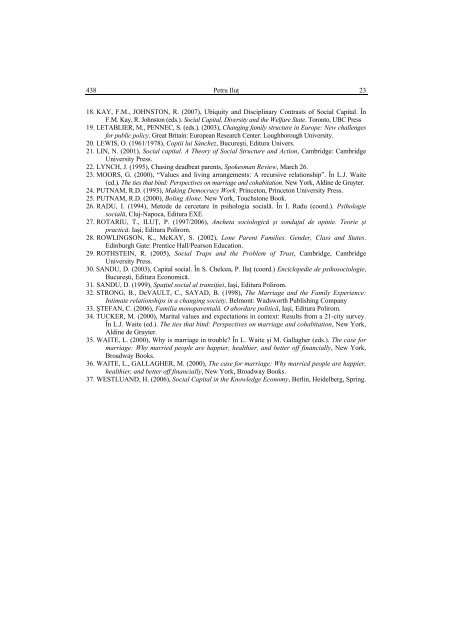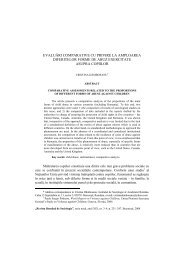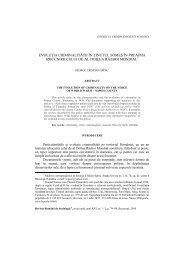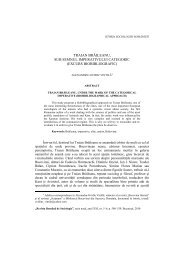Art 4 Ilut.pdf - Revista Romana de Sociologie
Art 4 Ilut.pdf - Revista Romana de Sociologie
Art 4 Ilut.pdf - Revista Romana de Sociologie
Create successful ePaper yourself
Turn your PDF publications into a flip-book with our unique Google optimized e-Paper software.
438<br />
Petru Iluţ 23<br />
18. KAY, F.M., JOHNSTON, R. (2007), Ubiquity and Disciplinary Contrasts of Social Capital. În<br />
F.M. Kay, R. Johnston (eds.). Social Capital, Diversity and the Welfare State. Toronto, UBC Press<br />
19. LETABLIER, M., PENNEC, S. (eds.). (2003), Changing family structure in Europe: New challenges<br />
for public policy. Great Britain: European Research Center: Loughborough University.<br />
20. LEWIS, O. (1961/1978), Copiii lui Sánchez, Bucureşti, Editura Univers.<br />
21. LIN, N. (2001), Social capital. A Theory of Social Structure and Action, Cambridge: Cambridge<br />
University Press.<br />
22. LYNCH, J. (1995), Chasing <strong>de</strong>adbeat parents, Spokesman Review, March 26.<br />
23. MOORS, G. (2000), “Values and living arrangements: A recursive relationship”. În L.J. Waite<br />
(ed.). The ties that bind: Perspectives on marriage and cohabitation. New York, Aldine <strong>de</strong> Gruyter.<br />
24. PUTNAM, R.D. (1993), Making Democracy Work. Princeton, Princeton University Press.<br />
25. PUTNAM, R.D. (2000), Boling Alone. New York, Touchstone Book.<br />
26. RADU, I. (1994), Meto<strong>de</strong> <strong>de</strong> cercetare în psihologia socială. În I. Radu (coord.). Psihologie<br />
socială, Cluj-Napoca, Editura EXE.<br />
27. ROTARIU, T., ILUŢ, P. (1997/2006), Ancheta sociologică şi sondajul <strong>de</strong> opinie. Teorie şi<br />
practică. Iaşi, Editura Polirom.<br />
28. ROWLINGSON, K., McKAY, S. (2002), Lone Parent Families. Gen<strong>de</strong>r, Class and States.<br />
Edinburgh Gate: Prentice Hall/Pearson Education.<br />
29. ROTHSTEIN, R. (2005), Social Traps and the Problem of Trust, Cambridge, Cambridge<br />
University Press.<br />
30. SANDU, D. (2003), Capital social. În S. Chelcea, P. Iluţ (coord.) Enciclopedie <strong>de</strong> psihosociologie,<br />
Bucureşti, Editura Economică.<br />
31. SANDU, D. (1999), Spaţiul social al tranziţiei, Iaşi, Editura Polirom.<br />
32. STRONG, B., DeVAULT, C., SAYAD, B. (1998), The Marriage and the Family Experience:<br />
Intimate relationships in a changing society. Belmont: Wadsworth Publishing Company<br />
33. ŞTEFAN, C. (2006), Familia monoparentală. O abordare politică, Iaşi, Editura Polirom.<br />
34. TUCKER, M. (2000), Marital values and expectations in context: Results from a 21-city survey.<br />
În L.J. Waite (ed.). The ties that bind: Perspectives on marriage and cohabitation, New York,<br />
Aldine <strong>de</strong> Gruyter.<br />
35. WAITE, L. (2000), Why is marriage in trouble? În L. Waite şi M. Gallagher (eds.). The case for<br />
marriage: Why married people are happier, healthier, and better off financially, New York,<br />
Broadway Books.<br />
36. WAITE, L., GALLAGHER, M. (2000), The case for marriage: Why married people are happier,<br />
healthier, and better off financially, New York, Broadway Books.<br />
37. WESTLUAND, H. (2006), Social Capital in the Knowledge Economy, Berlin, Hei<strong>de</strong>lberg, Spring.





